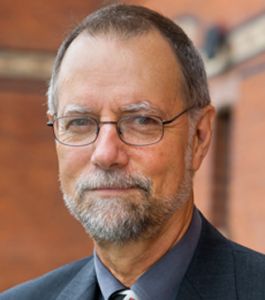
American big spenders trolling the Monaco Yacht Show might find the luxury "superyacht" with its own helicopter port a little more pricey if economist Robert H. Frank has his way. (Photo by Chris Ratcliffe/Bloomberg via Getty Images)
As part of our election series focusing on the issues that aren’t getting the attention they deserve in campaign 2016, we talked with Cornell University economist Robert H. Frank about how to address growing income inequality in the United States. Read the full transcript here or listen here.
Economist Robert Frank is arguably the country’s leading expert on wretched excess.
Over the course of a four-decade career as a distinguished academic (he has written several college textbooks, including one with former Federal Reserve Chairman Ben Bernanke), the Cornell University professor has developed a curious subspeciality: Studying the lifestyles of the filthy rich and spectacularly successful.
His anthropological field guides to life among the extremely affluent, including Luxury Fever and his recently published Success and Luck: Good Fortune and the Myth of Meritocracy, have led him to one conclusion: The 1 percent are a problem. But not necessarily for the reasons you might think.
The reason the nation’s wealthiest have become a menace to the commonweal, Frank has concluded, is not because of how much more they make than the rest of us. It’s how much more they spend.
For a society that has consumers (as opposed to private investment or the government) to thank for two-thirds of all its spending, that considers the Consumer Confidence Index a key measure of economic health, what Frank has to say might be regarded as unconventional, if not downright heresy. He prefers the term “radical pragmatism.”
It boils down to this: Scrap the income tax.
It’s not that Frank is a dour socialist who wants to completely level the playing field. Let the rich have their baubles, he said. Just impose reasonable limits, and keep the rest to make investments that will benefit everyone.
“Who’s happier? A guy driving a $300,000 Ferrari on roads riddled with foot-deep potholes, or somebody driving a $150,000 Porsche 911 Turbo on well-maintained roads?” reasoned the professor, whose reed-thin physique suggests a long-distance runner, but who described himself as an unredeemed “car buff.”
Ultimately, given the advances in technology that is replacing humans in even complex jobs, Frank said in an interview with BillMoyers.com, the next president may want to consider an even more radical method of sharing the wealth: A guaranteed income and a broad public works program that would subsidize displaced workers to take on socially useful tasks like planting green spaces, transporting the frail elderly and assisting in day care centers.
To Frank, the real source of the middle-class squeeze and much of the anger in the year’s presidential campaign, is both a matter of hard facts and human psychology.
The facts are that globalization and technology have promoted “winner-take-all” economies in which “winners” are able to completely shut out people and companies whose skills (or luck) and products are just marginally less than their own. That has led to “an enormous concentration of economic rewards,” Frank said.
The psychology is that when we humans have it, we like to flaunt it. Among the super-wealthy, Frank said, has triggered a “spending cascade” that forces people further down the income ladder to work more and more hours or go deeper and deeper into debt to keep pace. Call it trickle-down consumerism.
Whatever you do, just don’t call it keeping up with the Joneses on steroids. Frank finds that too judgmental. The reason the median family is spending 50 to 75 percent more to buy a house that’s at least 50 percent bigger than the ones they bought in 1970, or proud parents are spending more than three times as much on weddings than they did in 1980, Frank says, has less to do with envy or status-seeking than what he calls “context.”
To explain, Frank recalls a house he lived in when he was a young Peace Corps volunteer in rural Nepal. It had two rooms, no plumbing and no electricity. “Never once during the two years I lived in that house did it ever occur to me for an instant that the house was unsatisfactory in any way,” he said.
But he acknowledges, “if I lived in a house like that in Ithaca,” his home town in upstate New York, “it would have been shameful… a clear signal that I’d failed in some spectacular way to meet even the minimal expectations of society.”
Yes, on one hand, what Frank is describing is classic peer pressure. “There’s a sense in which people are a prisoner of what others do,” he said. But, he added, the consequences of not meeting the minimal expectations of society can be very real: “The better schools are located in the neighborhoods where the houses are more expensive,” he said. So middle-class families “bid up the prices, of course, in the better school districts.”
But if he believes “you can’t escape context,” Franks also is convinced that “it’s a problem we can solve politically.”
How his proposed “ steeply progressive consumption tax” would work: Taxpayers would report to the IRS how much they made and how much they saved. The difference is their consumption. Frank envisions a “big standard deduction, say $30,000 for a family of four” that would mean “people in the bottom half and slightly above would pay no more tax than they do under the current system.”
“Once your consumption goes beyond a certain point, though,” he said, “the rates begin rising.” How much? “Let me not frighten you,” Frank hesitated, evidently forgetting his context (speaking to a journalist). “But I’ll say, suppose it were 100 percent for people consuming already $5 million a year or more, what would that mean?”
It would mean the $1 million yacht might cost the purchasers $2 million. Or the $10 million New York City penthouse suddenly gets a price tag of $20 million. Frank doesn’t think it will stop luxury spending. But, he predicted, “By making additional purchases for people at the top of the ladder much more expensive, that would steer money out of those purchases and into savings and investment.”
In 1980, Frank said, the average expenditure for a wedding was $10,000; last year, $31,000. “Nobody thinks the people getting married who are spending $31,000 are happier,” he said. “In fact there’s some evidence that they are less happy because the extra debt they take on creates problems for them.”
It’s not that he’s looking to put florists out of business, but Frank argued, “florists and gratuitously expensive weddings aren’t inherently a better form of employment than people planning landscaping in public spaces. There are lots of things we could do that would generate employment that I think people would value more highly.”
Top on his list: Improved infrastructure. Noting that the American Society of Civil Engineers estimates the cost of the overdue maintenance at $3.6 trillion, he said that should be the top of the nation’s agenda.
Further down the road, Frank said, the next president may need to focus on growing “concern that new advances in AI — artificial intelligence — are putting people out of work who never thought they’d be automated out of their jobs.” As an example, he cited radiologists. That’s causing economists like him to have doubts about whether the labor market will continue to create enough new jobs to replace the ones that innovation destroys.
“We’ve started to hear now even conservatives calling cautiously for a basic income guarantee,” said Frank, who recommends that it be “too small to [allow people to live] wholly at taxpayer expense,” but able to be supplemented with low-income jobs “in the old tradition of public works employment.”
“A good life can never be had with just private consumption,” he said. “You need good schools, you need good roads, you need safety features to keep people from harm. And those expenditures contribute to well-being too.”
Frank doesn’t expect his recommendations to come to fruition overnight. “This is not a natural way for people to think about things,” he said. But, he noted, other once-unthinkable things, such as a tax on carbon consumption and legalized gay marriage, gained rapid acceptance once they had gathered momentum. “Things happen incrementally until they don’t,” said Frank. “Revolutions, when they come, are never widely predicted.”
(Contributing: John Light)





